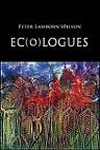 Sometimes the words of Peter Lamborn Wilson feel like a cattle prod but here they are more akin to a shepard's walking stick. He doesn't use them to steer people further into the herd mentality, but to lead, and perhaps seduce, readers into pastures that are altogether much more verdant, free, and open. The poems and essays in this book are not the idylls of the king, or any ruling class. Rather they praise the swampy haunts of lazy fishermen who do more beer drinking than line casting and celebrate feral children revolting against a decayed suburbia. And while they take their cue from the Eclogues of Virgil, those being a type of buccolic poetry depicting rustic subjects and the care of cattle, Wilson makes a definite link between being idle, idyllic poetry, and a form of idolatry that is insurrectionist in its connotations.
Sometimes the words of Peter Lamborn Wilson feel like a cattle prod but here they are more akin to a shepard's walking stick. He doesn't use them to steer people further into the herd mentality, but to lead, and perhaps seduce, readers into pastures that are altogether much more verdant, free, and open. The poems and essays in this book are not the idylls of the king, or any ruling class. Rather they praise the swampy haunts of lazy fishermen who do more beer drinking than line casting and celebrate feral children revolting against a decayed suburbia. And while they take their cue from the Eclogues of Virgil, those being a type of buccolic poetry depicting rustic subjects and the care of cattle, Wilson makes a definite link between being idle, idyllic poetry, and a form of idolatry that is insurrectionist in its connotations.
The book starts with a nod to British peasant poet John Clare, who in 1827 wrote a cycle of poems titled A Shepards' Calendar. (John Clare was also on influence on the Current 93 album Earth Covers Earth.) Peter gives us twelve poems for his own "Sheperds' Calendar". In starting with a meditation on the wheel of the year, with thoughts on the recurrence of moons, and the recurrence of seasons, the poet prepares the reader to think of larger cycles of time, to think of the fall of empires, and even the end of civilization itself. In homage to Clare, who grew up dirt poor on a rural farm, the first word of the first poem here is "Bumpkinism," what he describes as "…literally /[a] shit kicking hick". Then his pen lashes out against "urbane monotheists" and the "Nature Police". Wilson doesn't hold any punches back on those who adhere to the cult of progress. That was in January. In May he paints a description of the Wisconsin Driftless Region, home of the anarchist, permaculture & media collective, Dreamtime Village, where Wilson has lectured and spent time in the past. Here he is "Lying on midnight hillside surrounded by cows / waiting for meteor showers / the color of wormwood / -moonflowers / blooming by the old hotel". By August the poet has taken up the subject of oaninism. Though this could be simple self indulgence, here it is used in the service of Gaia. Throughout the book Wilson brings to light humanities erotic and libidinal longings for the things of the green world, hence the Eco in Ec(o)logues. In the mid-fall of October Wilson's mind turns to milkmaids, haylofts, and "shiftless hip-billies" twanging a lyre.
In various places he also makes reference to the great Irish epic the Tain Bo Culaigne, or The Cattle Raid of Cooley. I’ve read various portions of the Tain on and off over the past two years, but didn't feel like I really understood what it was all about until I went on a trip to Texas with my family over the summer. So I'm going to make a brief side trip to the Lone Star state before getting back to Wilson’s text. It may seem a strange byway for a deeper understanding of Irish myth, but that's how it happened. Of course the book I was reading at the time helped a lot, a Western-Fantasy novel by Midori Snyder called The Flight of Michael McBride. It tells the story of an Irish-American lad who flees on a train from a troubled relationship with his father in New York to the dusty frontier of Texas. He is also fleeing from supernatural beings who don't like iron: sidhe in other words. Eventually Michael gets a job as a cow poke but the sidhe are still after him. It was at this point that the story of the Tain Bo Culaigne really clicked for me. I could only understand the cattle raids of the ancient Irish by way of the Americas own cowboy mythology and mystique. Going to the stockyards in Fort Worth I came to appreciate on a deeper level what it must have been like to live as a rancher. Livestock become a persons literal livelihood. Not only in the 106 degree Faranheit heat of America's southwest, but also for herders across the Atlantic on the Emerald Isle.
Part of what Ec(o)logues does is not only give an update and critique to Virgil, but incorporates other pastoral tales, like the Tain into its heady vortex of ideas. In the piece "Violence Prose," Wilson talks about how "pastoral almost always seems to mean peaceful …but in Alba (ancient Scotland) & Albania & other wild remote backwards sheparding moutain or border cultures, pastoral violence occurs in a context of tribal anarchy -a system usually regulated only by some ancient unwritten code…". This also helped me further understand the clan feuds of the Tain Bo Culaigne. He goes on to say "Pastoral violence literally redistributes the Surplus so no clan gains economic power over another. Typically cows, horses & women are stolen & re-stolen in an extreme version of Levi-Straussian exchange: -a socialism of rustlers in which eventually a tragic existentialist sensibility will express itself in art." Is this what Wilson is advocating as an alternative to the current system? To answer the question I must turn to another portion of the book.
While nominally a poetry book, there are a few prose pieces included, like the "Violence Prose" above and his "Neo-Pastoralist Manifesto". Wilson has always excelled at writing manifestos. Whether he is extolling the virtues of Temporary Autonomous Zones or his notions of Immediatism, manifestos are a very recognizable part of his process. In part he does advocate "neo-luddite machine smashing & IWW-style sabotage" but also the "aesthetic sabotage of the Situationists". One part I enjoy is his notion of "Secular Anabaptism" where he says, "If you can’t revert to the Stone Age at least you can join the Amish in 1907". In the end his weapon of choice is nostalgia. "Violence at an 'impossible angle' to police power -we know of no actual examples: we’re well into Sword 'n Sorcery here".
Sorcery and magic are recurrent themes. While reading this book I was struck over and over again by Wilson's continuous call to arms for a return to various forms of superstitious thinking. Being a rather superstitious person myself I agree with him. Developing a personal grammar of superstition, e.g., a set of symbols which have meaning to an individual, and that can assist one in interpreting life when they are encountered is to take a step away from the dominant paradigms of industrial civilization towards the pastoral life extolled in the pages of this book. He speaks of "Green Hermeticism" and that "ecoremediation is alchemy". Or "Moorish shrines to Nature Elementals / all around rural Ulster Co. / a new dark age / of dirty religion / syncretistic to the point of delirium / ritual pollution / rural turpitude." In the Eclogue for Hekate, Goddess of the crossroads, he writes, "The Will to Power as Superstition / e.g. isn't it wiser to sell yr / soul to the Devil at the Crossroads / & cut six perfect blues 78s than / go unheralded into vague Virgilian Hades / with no one to spill blood to yr shade". This is just one of the forms his poetic terrorism takes in adjuring people to move towards a "New Twilight …forward in the Neothlithic. / Back to moonlight / & the lonely walk home from the pub / past haunted crossroads. No cars / no electricity. Endarkenment. Hekate"(italics are his own).
If all this isn't enough to think about and digest, also included is a lively essay on William Blake's Virgil woodcuts—the only woodcuts Blake ever made- and how these influenced the artist Samuel Palmer who made his own pastoralist woodcuts. Then there is his diet plan for Neo-Pastoralists. No need to fear going hungry: picnics and feasting become radical actions for the gourmand. Where does the food come from? Goat farming, which he writes about in "Goat Prose" (lacto-veggies can at least eat goat cheese). With some Neo-Pastoralist Folk music kicking around the solstice campfire it'll be time to bring out the Pan Pipes.



